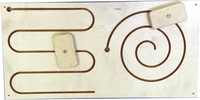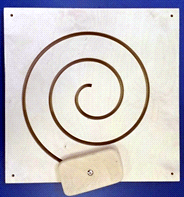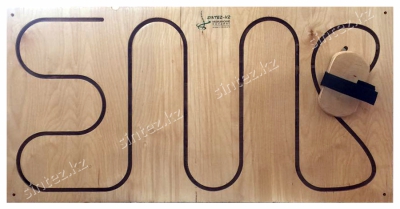Labyrinths for occupational therapy and motor
Labyrinths

For the development of fine, medium and gross motor skills, visually and manual coordination, the formation of simultaneous and reciprocal sensorimotor interactions, the sense of the boundaries of the body and the formation of spatial representations.
Fine motor skills - a set of coordinated actions of the nervous, muscular and skeletal systems, often in combination with the visual system in the performance of small and precise movements of the hands and fingers and toes.
Labyrinth-puzzles perfectly develop coordination and logical thinking.
The labyrinth is a plate with a system of channels and a handle sliding along one channel. The channels have different shape (trajectory) depending on the labyrinth model and degree of complexity. The patient has the ability to capture the hand and secure the palm, or foot, providing straps for fixing.


Application:
- prematurity;
- cerebral palsy or muscular dystrophy; abnormality, including mental retardation, congenital anomalies;
- pediatric diseases, for example child rheumatic arthritis;
- difficulties in learning, school underperformance; phrenopathy, behavioral problems, autism, phobias;
- alcohol or drug addiction, pathological social behavior, appetite disorders; neurological insufficiency on the basis of injuries, wounds of the brain and spinal cord;
- orthopedic restrictions on the basis of an accident or disease;
- occupational injuries including amputations, hand injury, burns;
- cardiovascular diseases, including myocardial infarction and peripheral vascular diseases; mental diseases and threats to mental health, including reactions to stress, alcohol and drug dependence, depression and schizophrenia; neurological dysfunction, including brain tumors, sclerosis; waste of physical functions as a result of arthritis, heart disease, cancer, cerebrovascular injury, Parkinson disease;
- decrease of cognitive functioning due to Alzheimer disease, organic brain lesion, arterial sclerosis or depression.



